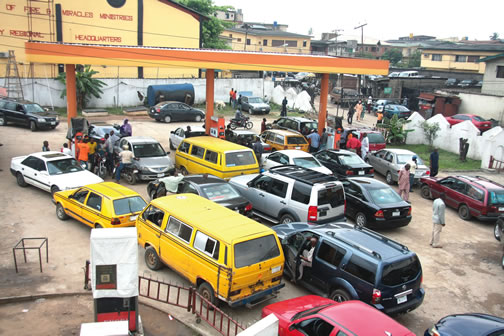
The two most perennial crises in Nigeria today are both energy related. One powers our homes and industries; the other powers our vehicles, homes, and industries. The importance of power and fuel in Nigeria cannot be overstated. These two have obviously become part and parcel of human existence. The ingenuity and unstoppable Nigerian spirit that devises survival strategy seems to have found succour in generators, inverters and others as alternatives to the power challenge in the country. In contrast it has been difficult for Nigerians to find fitting alternatives to the fuel crisis in the country, hence they are at the mercy of the government and the almighty marketers.
As usual the queues returned this holiday and Nigerians have been groaning in ways that can best be described by those who had to sacrifice some nights at fuel stations before they could secure some litres of petrol. Marketers took advantage of the situation and sold for as high as N500 per litre in some places. And as expected some unemployed youths also seized the moment to sell black market to desperate motorists. Suddenly, litres of petrol became the most appreciated Christmas gift anyone could present to a beloved friend or family. If President Muhammadu Buhari was ever shielded from unpleasant name-calling, this holiday marked the end of that honeymoon. The social media space was awash with all manners of inglorious names and description for the government. Even the staunch supporters of the APC government could not but express their displeasure. The palpable outrage was not primarily about fuel scarcity; it was rather propelled by the manner the government responded to the situation. The initial responses were that of denial and false assurances of sufficient supply across the nation, when Nigerians were already spending hours queuing to buy fuel.
To aggravate the irritation, while Nigerians were already going through excruciating time, the media handlers of the President felt the need to insult the intelligence of the people by airing the documentary titled “The human side of President Buhari.” On why the presidency was going ahead with airing the documentary, the Special Adviser to the President on Media and Publicity, Mr. Femi Adesina said “And I say, why not? Is life all about doom and gloom? Must we sit in ashes and wear sackcloth perpetually, and ignore the brighter side of life? God forbid!” “It’s a spice for the holiday season, and not even ephemeral fuel crisis would dampen the enthusiasm of positive minded Nigerians.” Sometimes one wonders if these media handlers are actually working for or against the President. Rather than project the human side of the president, the documentary did well in presenting the presidency as inhumane and unbothered about the sufferings of the Nigerian people.
Nonetheless, after days of pains and cries from the people the government was forced to act and the long queues have now been reduced to short queues. Many may want to believe that fuel scarcity is over and the queues have disappeared, but that may just be an interim reality considering the many factors bedevilling the sector. Whether the government expressly acknowledges or not, marketers are still being paid subsidy by the government. The Vice President attempted to give a lower profile to the situation by saying the NNPC pays for the subsidy on fuel. The question to ask is: on behalf of whom does the NNPC pay the subsidy and would there be any form of subsidy if the sector was fully deregulated? The plain but unpalatable truth is that there must be full deregulation for the downstream sector to function optimally. The involvement of the government in a product that it does not produce for sufficient local consumption has been the major problem of the sector. Marketers have to import the petrol and sell at a profitable price, but they cannot sell beyond the N145 price fixed by the government even when the total cost of a litre exceeds the selling price. To also ensure that the marketers sell at N145 the government provides the difference between the selling price and the landing cost. One of the major causes of the latest crisis is the increase in the landing cost of petrol which some marketers have put at N171. And as a result of this increase in cost, the marketers could no longer import since they will not be able to sell at profitable rate, yet there are no assurances from government to pay them the new extra cost incurred. This situation can be addressed determinedly by simply deregulating the sector completely. When prices are controlled by market forces, sooner or later the prices would reflect the fundamental law of demand and supply. It is now more important for the government to fully deregulate the sector in preparation for the refineries that will become active in 2019 and beyond. If that challenge is not addressed now, Nigerians should brace up for more days of scarcity either now or in the future.